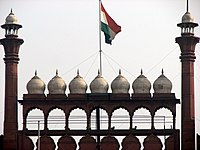In 1946, the Labour government in Britain, its exchequer exhausted by the recently concluded World War II, and conscious that it had neither the mandate at home, the international support, nor the reliability of native forces for continuing to control an increasingly restless India, decided to end British rule of India, and in early 1947 Britain announced its intention of transferring power no later than June 1948.
As independence approached, the violence between Hindus and Muslims in the provinces of Punjab and Bengal continued unabated. With the British army unprepared for the potential for increased violence, the new viceroy, Louis Mountbatten, advanced the date for the transfer of power, allowing less than seven months for a mutually agreed plan for independence. In June 1947, the nationalist leaders, including Pandit Nehru, Abul Kalam Azad, Mohammed Ali Jinnah, B. R. Ambedkar and Master Tara Singh agreed to a partition of the country along religious lines. The predominantly Hindu and Sikh areas were assigned to the new India and predominantly Muslim areas to the new nation of Pakistan; the plan included a partition of the provinces of Punjab and Bengal.
Many millions of Muslim, Sikh, and Hindu refugees trekked across the newly drawn borders. In Punjab, where the new border lines divided the Sikh regions in half, massive bloodshed followed; in Bengal and Bihar, where Gandhi's presence assuaged communal tempers, the violence was more limited. In all, anywhere between 250,000 and 500,000 people on both sides of the new borders died in the violence. On 14 August 1947, the new Dominion of Pakistan came into being, with Muhammad Ali Jinnah sworn in as its first Governor General in Karachi. At the stroke of midnight, as India moved into August 15, 1947, Jawaharlal Nehru, read out the famous Tryst with destiny speech proclaiming India's independence.India, now a smaller Union of India, became an independent country with official ceremonies taking place in New Delhi, and with Jawaharlal Nehru assuming the office of the first prime minister, and the viceroy, Louis Mountbatten, staying on as its first Governor General.
Celebrations

The Prime Minister of India hoists the Indian flag on the ramparts of the historical site, Red Fort (लाल क़िला), Delhi, on August 15. This is telecasted live on the National Channel Doordarshan and many other News Channels all over India. Flag hoisting ceremonies and cultural programs take place in all the state capitals. In the cities around the country the national flag is hoisted by politicians in their constituencies. In various private organisations the flag hoisting is carried out by a senior official of that organisation. All over the country, flags are given out to citizens who wear them proudly to show their patriotism towards India. Schools and colleges around the country organise flag hoisting ceremonies and various tural events within their premises, where younger children in costume do impersonations of their favourite characters of the Independence era. They also have a parade. Families and friends get together for lunch or dinner or for an outing. Housing colonies, cultural centres, clubs and societies hold entertainment programs and competitions, usually based on the Independence Day theme. Most national and regional television channels screen old and new film classics with patriotic themes on Independence Day. Many non-governmental organizations telecast patriotic programs. It is a national festival that is celebrated by every Indian irrespective of religion.
No comments:
Post a Comment